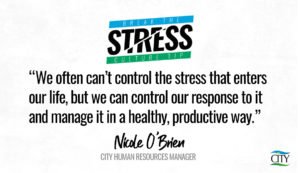Break the Stress | Culture Tip by Nicole O’Brien
When our jobs are at their most hectic, our approach to work can shift from “How do I get everything done?” to “How do I survive this?” To cope with intense times, try a few of the below strategies.

Use Premack’s principle.
One strategy is to reward yourself for finishing a tough task. In psycho-science terms this is called “Premack’s principle” . In other words, use an easier behavior as a reward for a harder behavior. For instance, you can reward yourself for finishing a cognitively demanding task (like calling an upset customer) by completing a low-key but necessary task, like running an errand. This approach can help you pace yourself during your work day, ensuring that you get regular breaks during which your mind can shift into a more relaxed gear, while still being productive. Think of it like recovering from bursts of running by walking instead of stopping.
Compartmentalize.
Tasks you actually enjoy can become tense, unpleasant experiences if, while you’re doing them, you’re mentally elsewhere, feeling stressed and anxious about the other hundred things on your list. What’s quite pleasurable or satisfying for you, even though it’s time-consuming? If the task is important and you’re approaching it efficiently, allow yourself to enjoy it. For recurrent hard assignments, think about the parts of it you like best at the beginning, middle, and end stages. By articulating distinct, enjoyable aspects of tasks, you can be more mindful and savor them. For example, if you enjoy giving your team members positive feedback but hate typing it out, spend your time focusing on those aspects of the task you enjoy. We all probably have equal amounts of task we really dread and those we don’t mind in the course of our day. So why do we devote such a high percentage of our mental energy into focusing on that which we perceive as negative. Be mindful and focus on that piece of the project that you enjoy to help yourself power through the more difficult moments.
Save small scraps of time for mental rest.
When you’re very busy, it’s tempting to try to cram productive activity, like responding to email or thinking through decisions, into any small crack of time. This could be when you’re waiting for a meeting to start, or in the five minutes between finishing one thing and starting a new project. When you’re slammed, it can seem essential to work during these moments. However, consider using brief waiting times for true mental breaks. Take some slow breaths, drop your shoulders, and deep breathing can trick your brain into thinking you’re relaxed and have a cascading impact on your mindset and ability to focus. You will be surprised by the effect of a few well timed deep breaths on your physiology. You don’t need to take an all-or-nothing approach to this tip, of course. If using small scraps of time to keep work moving sometimes suits you, keep doing it Monday to Friday, but, on the weekend, consider giving yourself those little breaks. Find the balance that works for you.
Add physical decompression rituals to your day.
When we’re overloaded, we can hold a lot of physical tension. This is partly due to our in-built fight/flight/freeze response to fear or stress. For instance, the evolutionary basis of balled fists is your prehistoric self-preparing to run or punch. Some people breathe faster when they’re stressed. Some adopt an aggressive, dominant tone of voice or body language. Since these reactions are often unconscious, you’ll need prompts to correct them. Try using context triggers — deciding which moments in the day you’ll use to physically decompress. For instance, maybe you can take some slow breaths whenever you go to the bathroom, or just after you wake up or just before you get into bed. You can also use emotions as triggers, like “When I notice I feel stressed, I’ll scan my body for tension and soften and release any spots I find.” If you’re not sure how to do this, just try opening and closing your fists a few times, clenching and unclenching your jaw, or scrunching and dropping your shoulders. Our thoughts, emotions, and bodily reactions are a feedback loop. When you mimic the physiology of someone who is relaxed, you’ll find that your thinking becomes less closed, and psychologically challenging activities in which you need to think openly, like taking in feedback, will seem easier.
Pair pleasure experiences with other activities.
You can buffer yourself against the stress of feeling rushed and overloaded if you recurrently pair simple sources of pleasure with particular activities you’re not as excited to do. For example if you only allow yourself a decadent dessert to reward yourself for visiting a challenging customer; or, if you hate your commute but love podcasts, perhaps begin a routine of listening to specific shows on your commute home each day of the week. If what you love isn’t as simple as desserts or podcasts, set aside just a bit of consistent time to indulge in your interest, so you’ve removed decision-making as a barrier. For instance, if cooking is your passion, perhaps you whip up a big batch of something on Sundays that you can then take as lunch for the week.
Change and stress happen no matter where you work or where you find yourself in life. We often can’t control the stress that enters our life, but we can control our response to it and manage it in a healthy, productive way. Remember it’s important to make note of all the positive things we see happening each day!
Adapted from “How to Get Through an Extremely Busy Time at Work by Alice Boyes, PhD is a former clinical psychologist turned writer and is author of The Healthy Mind Toolkit and The Anxiety Toolkit.
Comments
Comments are closed.